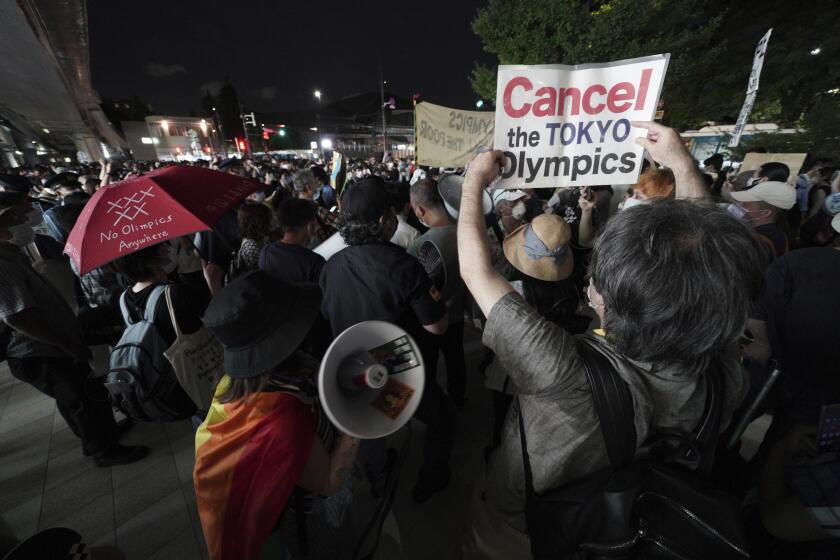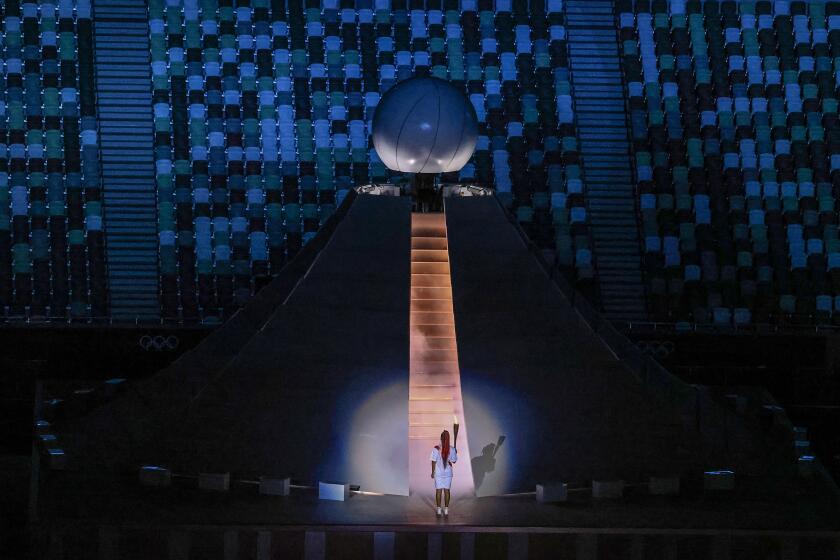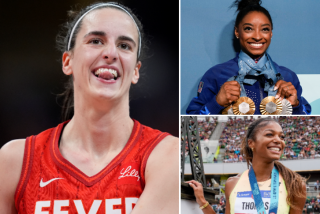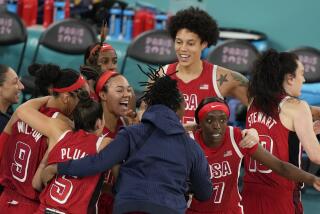WNBA stars helping fuel 3-on-3 basketball’s golden moment in Olympics
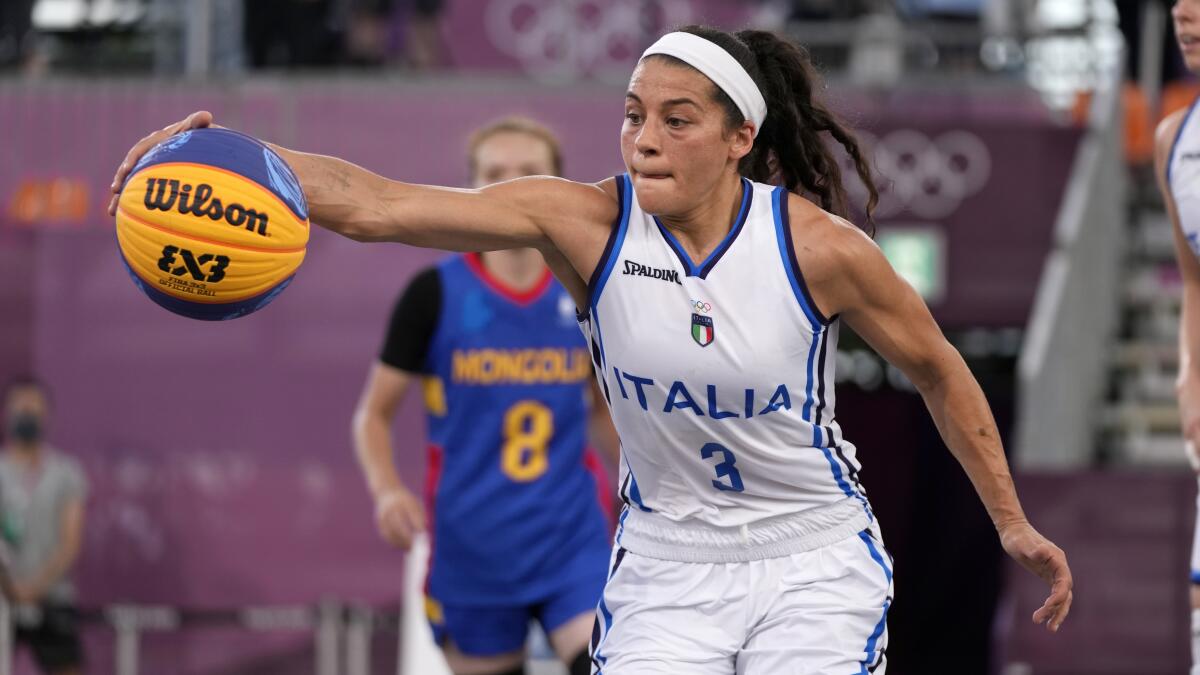
TOKYO — Round up up three people and then find three more. Play to 21 by ones and twos or most points scored in 10 minutes. It’ll be hot. It’ll be humid. Barely any fouls will be called.
Got it?
OK. Check ball.
Seriously. Check the ball. Because this ball doesn’t look like the basketball you know. It’s yellow and blue, grooved like the skin of a pumpkin and weather-proof.
Welcome to 3-on-3 basketball, a sport that’s come all the way from your neighbor’s driveway to its Olympics debut, the latest in the Games’ attempt to take something familiar and make it younger, edgier, faster and wilder.
Forget about showcasing Japanese ingenuity to the world. The people in Tokyo can’t even be convinced that the Olympics will offer any value to them.
“It’s just like a tornado,” Italian guard Rae Lin D’Alie said with a Wisconsin accent as thick as beer cheese soup.
It’s part car crash, part permanent fast break.
As the sun set over the event’s grand opening, U.S. First Lady Jill Biden jumped out of her seat to applaud a 17-10 victory by the U.S. over France.
On his way out of the Aomi Urban Sports Park, French President Emmanuel Macron was asked by an American journalist about the U.S. performance against his team.
“Come on, come on. They defeated us,” Macron said with a grin. “It was sufficiently painful.”
It was also sufficiently amazing.
Played outdoors under a canopy that fittingly looked like a circus big top, this iteration of basketball made for as electric an atmosphere as you can get when the only people in the stands are dignitaries, volunteers and a Japanese youth basketball team hanging out in the edges of the rafters.
They witnessed four WNBA players parachute into a sport played full time by their opponents and mostly dominate FIBA’s top-ranked team.
“Did it look like I had jet lag?” U.S. guard Kelsey Plum said.
The former No. 1 overall pick said her attitude about playing in a perceived undercard to the main men’s and women’s tournament is “Why not” do this?
“To make a five-on-five team in the United States is nearly impossible, you know, and so as a young player, why not get the experience and then try to hit it on the next round?” she said.
The American men’s team, the reigning world champions, failed to qualify with no current NBA players after losing to the Netherlands in the quarterfinals of the qualifying tournament. The women’s team, with WNBA stars, picked it up quickly.
“I’m used to the air conditioning,” Allisha Gray said about adjusting to the wind and heat.
Each team has four players including one substitute who can check in after any stoppage. The game is played on a half court (the teams share the basket for pregame layups), with a 12-second shot clock. And just like at the park, you’ve got to take the ball back behind the three-point line, except it’s really a two-point line.
There was an in-house DJ and two in-house MC’s commentating with the players’ nicknames (one in English, one in Japanese). D’Alie is “Rae Rae.” USA center Stefanie Dolson is “Big Mama.”
They’re characters — D’Alie’s voice drips with her Wis-can-sen accent when she speaks Italian or when she proclaims her love for the Wisconsin Badgers and her pride in the Milwaukee Bucks’ championship.
Born in Waterford, Wis., she found the discipline by playing with some of her Italian league teammates and fell in love with the game — a form of basketball with the pace and space that NBA teams crave built right into the rules.
“It’s like backyard basketball, where … you just find a way to win. And sometimes it doesn’t look great. And sometimes it looks really awesome,” D’Alie, who hit the game-winner to qualify Italy, said. “It’s really fun that way and there’s a lot of space for creativity and spontaneity.”
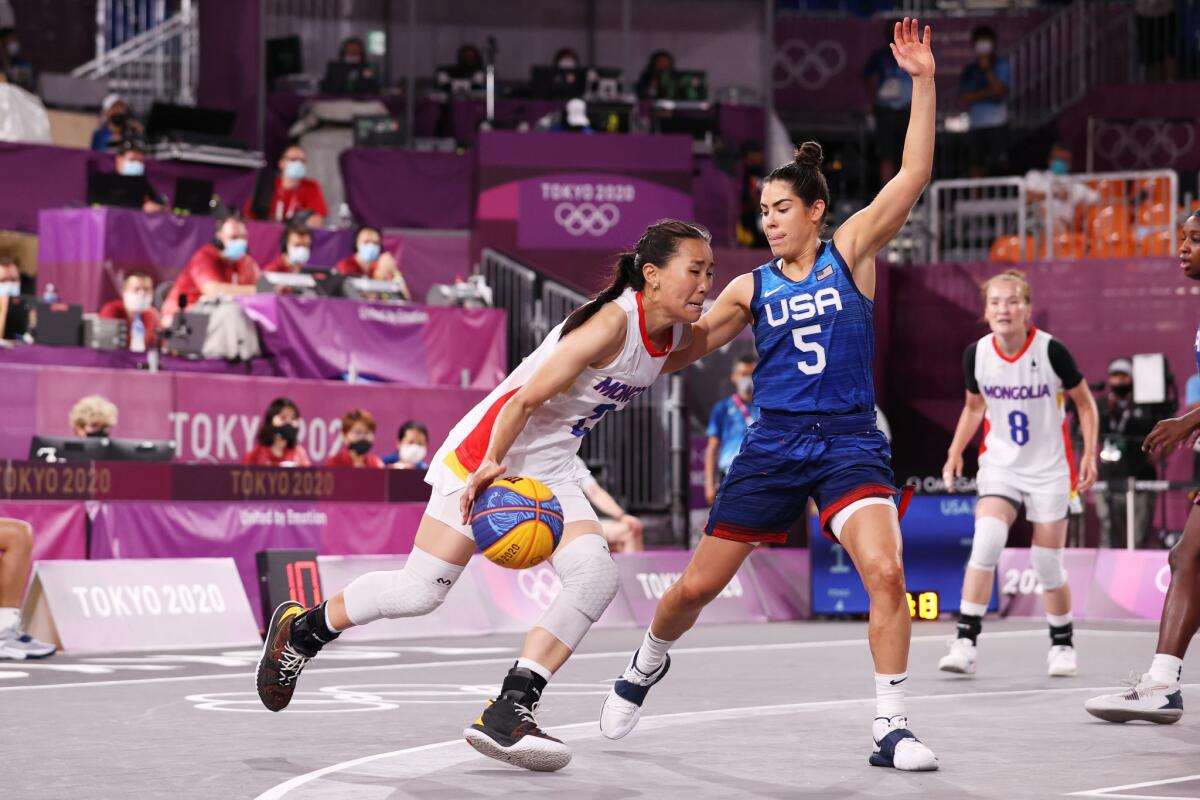
And then there’s soon-to-be 39-year-old Ira Brown, a 6-foot-4 American power forward in Japan’s pro basketball leagues who somehow ended up as a Japanese Olympian after being an eighth-round pick of the Kansas City Royals to pitch in 2001.
When he was firing fastballs for the Edmonton Cracker-Cats in the Northern Independent League, he could’ve never imagined representing Japan in basketball. But 3-on-3? It’s a haven for things like this.
“That would have sounded very crazy,” Brown said. “Obviously, when I was younger, basketball was definitely not in in the cards. I love to play the game, but obviously baseball was my love. But, I’m here now so it’s a blessing. But for sure I wouldn’t ever thought it in my mind.”
Down by one in the final seconds of a game with Poland with DMX bumping on the speakers, Brown tied the score for the host country. But as fast as the party went up, it came crashing down when Poland hit a game-winner in sudden-death, first-to-two overtime.
Still, Brown got to compete in the Olympics.
“I can’t even express that. I mean, I can’t express it,” Brown said. “It’s just, it’s just, mind-blowing, mind-blowing that I’m here.”
FIBA Secretary General Andreas Zagklis called the debut “historic.” Players such as Plum, D’Alie and Brown beamed after their debuts. It felt like a weird, wonderful success.
Zagklis noted how the Belgium men’s team managed to upset Latvia — the lead changing four times in the last 25 seconds is kind of the template for what a professional 3-on-3 game can look like.
The U.S. women, the major favorites, won twice, helping put American eyes on the sport. And other nations provided the fireworks, showing why people believe this formalized version of street basketball can grow.
A look at some of the biggest moments from the Tokyo Olympics opening ceremony from Times photographers Robert Gauthier and Wally Skalij.
If you can award medals in indoor and outdoor versions of volleyball, why not in basketball?
After beating France, they cruised past Mongolia, a country that’s never played Olympic basketball before 3-on-3’s introduction Saturday. A gold medal will be given out Wednesday, the Americans almost a certainty to claim it.
But along the way, enjoy Big Mama, the fastball-throwing baller, the Italian Badger and the rest of the characters.
“Five on five is where players make their money,” U.S. 3-on-3 coach Kara Lawson said. “But they’d say this is more fun.”
Sure looks like it.
More to Read
Go beyond the scoreboard
Get the latest on L.A.'s teams in the daily Sports Report newsletter.
You may occasionally receive promotional content from the Los Angeles Times.

